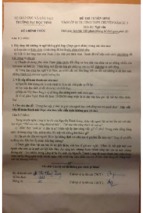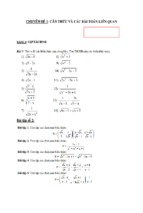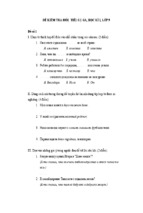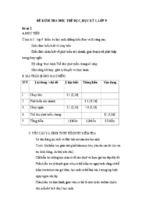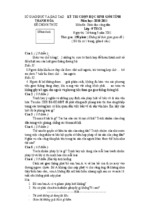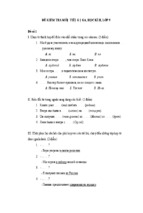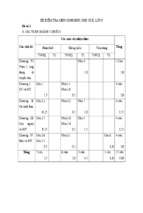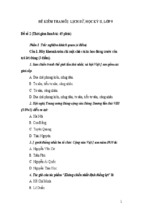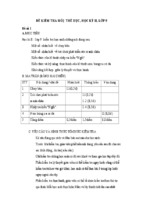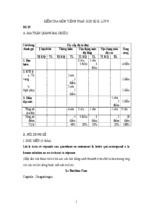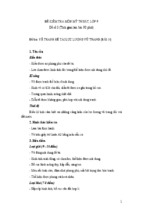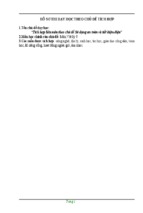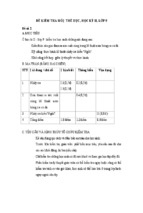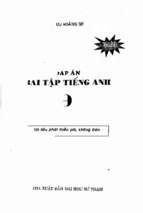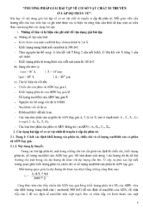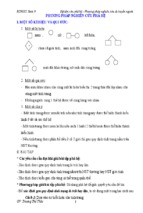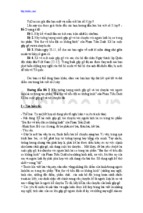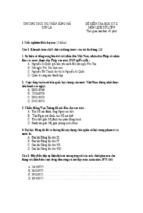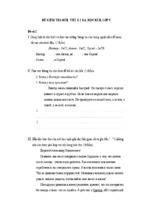Tuyển tập 20 đề thi (có keys) vào lớp 10 chuyên Anh trên toàn quốc trong vài năm gần đây. là bản WORD, vì vậy có thể biên tập theo ý muốn của từng giáo viên
Contents
TEST 1....................................................................................................................................................................... 3
KEYS 1.....................................................................................................................................................9
TEST 2..................................................................................................................................................................... 10
KEYS 2......................................................................................................................................................17
TEST 3..................................................................................................................................................................... 18
KEYS 3......................................................................................................................................................26
TEST 4................................................................................................................................................................... 27
KEYS 4......................................................................................................................................................32
TEST 5..................................................................................................................................................................... 33
KEYS 5......................................................................................................................................................39
TEST 6.................................................................................................................................................................. 41
KEYS 6...................................................................................................................................................48
TEST 7..................................................................................................................................................................... 49
KEYS 7......................................................................................................................................................56
TEST 8..................................................................................................................................................................... 58
KEYS 8......................................................................................................................................................65
TEST 9..................................................................................................................................................................... 66
KEYS 9...................................................................................................................................................71
TEST 10................................................................................................................................................................... 72
KEYS 10.................................................................................................................................................80
TEST 11................................................................................................................................................................... 81
KEYS 11....................................................................................................................................................88
TEST 12................................................................................................................................................................... 91
KEYS 12...............................................................................................................................................100
TEST 13.................................................................................................................................................................101
KEYS 13..................................................................................................................................................108
TEST 14.................................................................................................................................................................109
KEYS 14..................................................................................................................................................118
TEST 15.................................................................................................................................................................119
KEYS 15................................................................................................................................................128
TEST 16.................................................................................................................................................................130
KEYS 16...............................................................................................................................................142
TEST 17.................................................................................................................................................................145
KEYS 17..................................................................................................................................................157
TEST 18.................................................................................................................................................................160
KEYS 18..................................................................................................................................................174
TEST 19.................................................................................................................................................................176
KEYS 19..................................................................................................................................................182
TEST 20.................................................................................................................................................................183
KEYS 20..................................................................................................................................................190
TEST 1
PART A: PHONETIC
I. Choose the word whose underlined part is pronounced differently from that of the others.
1. A. cave
B. Have
C. Behave
D. pave
2. A. Receipt
B. Recall
C. recollect
D. recover
3. A. card
B. heard
C. hearth
D. heart
4. A. abuse
B. refuse
C. fuss
D. future
5. A. Adventure
B. future
C. mature
D. figure
II. Choose the word whose main stressed syllable is placed differently from that of the others.
6. A. admirable
B. Accessible
C. Compatible
D. Respiratory
7. A. Humane
B. Unite
C. Colleague
D. Canteen
8. A. Descent
B. Dissent
C. Discontent
D. Content (adj)
9. A. Eradicate
B. Kilometer
C. Characterize
D. Communism
10. A. Technical
B. Origin
C. Agriculture
D. Cathedral
PART B: LEXICO AND GRAMMAR
I. Choose the best answer to complete each of the following sentences.
11. A number of oil tankers have been laid_________ recently.
A. on
B. down
C. up
D. in
12. The inscription on the tombstone has been worn _____ by the weather and could scarcely be read.
A. away
B. off
C. out
D. on
13. ______ second thoughts, I’d rather not go out tonight.
A. with
B. in
C. on
D. Under
14. The new hairdryer does not comply ______ British safety standard.
A. to
B. with
C. against
D. on
15. Many books were not available to the public because of government_________.
A. omission
B. inhibition
C. compensation
D. censorship
16. The woman accused of shoplifting was found not guilty and was____________.
A. excused
B. liberated
C. acquitted
D. interned
C. eminent
D. quality
17. He is a(n)________ authority on the subject.
A. prominence
B. expert
18. My car was so old that I could only sell it for _______.
A. rubbish
B. scrap
C. debris
D. waste
19. Not only__________ in the project, but he also wanted to become the leader.
A. did jack involve
B. had jack been involved
C. was jack involved
D. Jack was involved
20. I felt a bit _______ and seemed to have more aches and pains that usual.
A. out of shorts
B. on the mend
C. over the worst
D. under the fevers
21. The school was closed for a month because of a serious ______ of fever.
A. outcome
B. outburst
C. outset
D. outbreak
C. have I
D. hasn’t he
22. I don’t think he’s ever been there, _________?
A. do I
B. has he
23. They had a four-days holiday, then began work____________.
A. on end
B. out of bounds
C. in proportions
D. in earnest.
24. He is a tough politician – he knows how to _____ the storm.
A. run down
B. keep up
C. ride out
D. push back
25. On entering the nursery I stumbled on the wooden blocks _____ all over the carpet.
A. plunged
B. scattered
C. settled
D. tossed
II. Fill in the blank with a suitable noun to form the idiomatic expression.
26. I’d like the take ________ of this opportunity to explain the difficulty I’ve met.
27. She decided to set ______ to these letters because they weren’t necessary.
28. Don’t have ______ in what he says. He is a liar.
29. For generations our people got_____over many enemies and drove them away.
30. He left home without taking ______ of anybody.
III. Give the correct form of the word given in parentheses.
31. The attack in the city center last night (example) the kind of behavior amongst young people that
many object to.
32. This matter is very (confidence). Don’t discuss it outside the office.
33. You shouldn’t interrupt someone in (sentence).
34. I want to make sure all my (depend) will be financially secure if I’m incapacitated in any way.
35. There was a heavy (pour) yesterday afternoon which completely ruined the church Garden Party.
36. There is a risk factor with all medication, but honestly the risk with this particular drug is (neglect).
37. A (dominate) friend is one who likes power.
38. Suddenly without (provoke), the dog sank its teeth into my leg.
39. Street-fights are an everyday (occur) in this area of the city.
40. I really believe that it would be a major mistake to (crime) any drugs that are currently illegal.
IV. Match the verb in box a with the word (s) in box to form A phrasal verb, and then fill it in each
blank to complete the sentences, be sure to use the correct verb tense and form.
A
put, apprise, go, crease, stem, fall, pull,
center, brood, carry
B
from, over, away, off, on, of, up, back on,
through, in for.
41. The problem_______________ the government’s lack of action.
42. The argument is ____________ whether or not to lower the age limit.
43. Don’t waste time _______________ your past failures.
44. I’m afraid there is no milk left; we have to _____________ dried milk for our tea.
45. Tom got ____________ b the music and wouldn’t stop singing.
46. I’m going to stay at university and try to __________ getting a job for a few years.
47. Her husband has been ______________ the good news about his son.
48. She swims so well that she really should ______________ the competition.
49. I almost ________________ when I heard Tim was going to be playing Romeo in the school play.
50. He is in critical condition in hospital, so we’re all praying he’ll _____________.
PART C: READING
I. Read the following passage carefully and then choose the best option to fit each space.
Keeping your distance
Personal space is a term that refers (51) ………. the distance we like to keep between ourselves
and other people. When (52) …………. we do not know well gets too close we usually begin to
feel uncomfortable. If a business colleague comes close than 1.2 meters, the (53) ……… common
response is to move (54) ……… . Some interesting (55) ……….. have been done in libraries. If
strangers come too close, any people get up and leave the building; others use different methods such as
turning their back on the intruder. Living in cities has (56) ... ... people develop new skills for dealing
with situations (57) ………. they are very close to strangers. (58) ……….. people on crowded trains try
not to look at strangers; they avoid skin contact, and apologize if hands touch by mistake. People use
newspapers (59) …….. a barrier between themselves and other people, and if they do not have one, they
stare into the distance, (60) …………. sure they are not looking into anyone’s eyes.
51.
A. about
B. from
C. to
D. for
52.
A. nobody
B. anyone
C. someone
D. people
53.
A. more
B. most
C. best
D. first
54.
A. away
B. up
C. on
D. in
55.
A. studies
B. questionnaires
C. research
D. survey
56.
A. caused
B. allowed
C. made
D. done
57.
A. that
B. where
C. how
D. which
58.
A. Almost
B. The most
C. Most
D. Most of
59.
A. alike
B. like
C. as
D. such as
60.
A. making
B. made
C. make
D. be
II. Read the following passage carefully and then choose the best answer to each question.
In most discussions of cultural diversity, attention has focused on visible, explicit aspects of
culture, such as language, dress, food, religion, music, and social rituals. Although they are important,
these visible expressions of culture, which are taught deliberately and learned consciously, are only the
tip of the iceberg of culture. Much of culture is taught and learned implicitly, or outside awareness.
Thus, neither cultural insiders nor cultural outsiders are aware that certain “invisible” aspects of their
culture exist.
Invisible elements of culture are important to us. For example, how long we can be late before
being impolite, what topics we should avoid in a conversation, how we show interest or attention
through listening behaviour, what we consider beautiful or ugly- these are all aspects of culture that we
learn and use without being aware of it. When we meet other people whose invisible cultural
assumptions differ from those we have learned implicitly, we usually do not recognize their behaviour
as cultural in origin.
Differences in invisible culture can cause problems in cross-cultural relations. Conflicts may
arise when we are unable to recognize others’ behavioural differences as cultural rather than personal.
We tend to misinterpret other people’s behaviour, blame them, or judge their intentions or competence
without realizing that we are experiencing cultural rather than individual differences.
Formal organizations and institutions, such as schools, hospitals, workplaces, governments, and
the legal system are collection sites for invisible cultural differences. If the differences were more
visible, we might have less misunderstanding. For example, if we met a man in a courthouse who was
wearing exotic clothes, speaking a language other than ours, and carrying food that looked strange, we
would not assume that we understood his thoughts and feelings or that he understood ours. Yet when
such a man is dressed similarly to us, speaks our language, and does not differ from us in other obvious
ways, we may fail to recognize the invisible cultural differences between us. As a result, mutual
misunderstanding may arise.
61. What is the main purpose of the passage?
A. To point out that much of culture is learned consciously.
B. To describe cultural diversity.
C. To explain the importance of invisible aspects of culture.
D. To explain why cross-cultural conflict occurs.
62.
The word “rituals” in paragraph 1 is closest in meaning to __________.
A. assumptions
B. formalities
C. aspects
D. cultures
63. The phrase “the tip of the iceberg” in paragraph 1 means that ___________.
A. most aspects of culture cannot be seen
B. we usually focus on the highest forms of culture
C. other cultures seem cold to us
D. visible aspects of culture are learned in formal institutions
64. Which of the following was NOT mentioned as an example of invisible culture?
A. How people express interest in what others are saying
B. How late is considered impolite
C. What topics to avoid in conversation
D. What food to eat in a courthouse
65. The word “those” in paragraph 2 refers to__________.
A. invisible cultural assumptions
B. people from a different culture
C. topics that should be avoided in conversation
D. people who speak a different language
66. It can be inferred from paragraph 3 that conflict results when ___________.
A. one culture is more invisible than another culture
B. people compete with those from other cultures
C. some people recognize more cultural differences than others
D. people think cultural differences are personal
67. The author implies that institutions such as schools and workplaces ________.
A. reinforce invisible cultural differences
B. are aware of cultural differences
C. share a common culture
D. teach their employees about cultural differences
68. Which of the following would most likely result in misunderstanding?
A. Strange behaviour from someone speaking a foreign language
B. Learning about our own culture in school
C. Strange behaviour from someone speaking our language
D. Unusual food being cooked by foreign visitors
69. The word “exotic” in paragraph 4 could best be replaced by__________.
A. formal
B. expensive
C. foreign
D. informal
70. The following sentence can be added to paragraph 2 of the passage.
Rather, we see them as rude or uncooperative, and we may apply labels to them, such as
“passive aggressive.”
Where would it best fit in the paragraph? Choose A, B, C or D.
A. …….. Invisible elements of culture are important to us.
B. ……. For example, how long we can be late before being impolite, what topics
we should avoid in a conversation, how we show interest or attention
through listening behavior, what we consider beautiful or ugly-these are all
aspects of culture that we learn and use without being aware of it.
C. ……. When we meet other people whose invisible cultural assumptions differ
from those we have learned implicitly, we usually do not recognize their
behavior as cultural in origin..
D. ……………
PART D: WRITING
I. Rewrite the sentence, using the word in the bracket so that the second sentence has exactly the
same meaning.
71. If there is an accident phone the emergency services. (OF)
Phone the emergency services __________________ an accident.
72. I couldn’t have bought that motorbike unless my father had agreed to pay the monthly repayments.
(BUT)
_____________________________ agreeing to pay the monthly repayments, I could never have
bought that motorbike.
73. I have a lot of respect for her writing style although I do not agree with the opinions she expresses.
(MUCH)
Much___________________ her writing style, I do not agree with her opinions.
74. Even though her B grade in English wasn’t quite as high as she had expected, it was still a good
result. (IF)
Her grade B in English, __________________________, was still a good result.
75. Purchases may be refunded within seven days. (MIND)
Should ____________________ your purchase you have up to seven days to bring it back for a
refund.
76. Providing that you make up the time later in the week you can take Monday off. (CONDITION)
You can have the day off on Monday______________ make up the time later in the week.
77. The mistake in the accounts was not noticed until the figures were re-checked. (LIGHT)
The mistake in the accounts only_______________ the figures were re-checked.
78. I had no problems at all during my trip to New York. (PLAN)
Everything ________________ during my trip to New York.
79. The reforms will not succeed unless they are carefully planned. (CRUCIAL)
Careful_____________ of the reforms.
80. They think that Henry’s brother stole the money. (SUSPECTED)
Henry’s brother ______________________ the money.
KEYS 1
1.
B
2.
A
3.
B
4.
C
5.
C
6.
A
7.
C
8.
C
9.
A
10.
D
11.
C
12.
A
13.
C
14.
B
15.
D
16.
C
17.
C
18.
B
19.
C
20.
A
21.
D
22.
B
23.
D
24.
C
25.
B
26.
advantage
27.
fire
28.
faith
29.
victory
30.
leave
31.
exemplified/
32.
confidential
33.
midsentence
34.
dependants/
35.
downpour
exemplifies
dependents
36.
negligible
37.
domineering
38.
provocation
39.
occurrence
40.
decriminalize
41.
stems/stemmed
from
42.
centered on
43.
brooding
over
44.
fall back on
45.
carried away
46.
put off
47.
apprised of
48.
go in for
49.
creased up
50.
pull through
51.
C
52.
C
53.
B
54.
A
55.
A
56.
61.
66.
C
C
D
57.
62.
67.
B
B
A
58.
63.
68.
C
A
C
59.
64.
69.
C
D
C
60.
65.
70.
A
A
d
71
.
73
.
75
.
77
.
79
.
in case of
72
.
Much as I respect/ Much though I respect
74
.
you change your mind about
76
.
came to light when/ after/ once
78
.
planning is crucial to/ for the success/ plans 80
are crucial to/ for the success
.
But for my father
if a little lower than expected
on condition that you/ on condition you
went according to plan
is suspected of having stolen/ is suspected
of stealing
TEST 2
PART A: USE OF ENGLISH
I. Choose the best answer from A, B, C or D to complete following sentences.
1. As a citizen, it is normal to _________ to the laws and rules made by the society.
A. conform
B. Resist
C. Hinder
D. obey
2. He attempted to _________the painting from the gallery but he was caught.
A. rob
B. Steal
C. Thief
D. kidnap
3. Once the computer virus was removed, a lot of information ________.
A. is disappearing
B. will have disappeared
C. disappears
D. disappeared
4. Telecommuter boosters will often mention _________convenient it is for people
wishing to cut down on their work hours.
A. how
B. therefore
C. only
D. most
5. A: “Will the Jackson be invited?”– B: “I_________.”
A. expect so not
B. so expect
C. expect so D. don’t expect
6. I read the contract again and again ___________avoiding making spelling mistakes.
A. with a view to
B. on account of
C. by means of
D. in terms of
7. In a report submitted to the government yesterday, scientists ____that the building of
the bridge be stopped.
A. banned
B. complained
C. said
D. recommended
8. Anyone ordering a new MP3 player _____ the end of the month will receive a free
extra set of headphones.
A. at
B. in
C. upon
D. before
9. I enjoyed reading that story. It was rather sad, _________.
A. also
B. though
C. but
D. so
10. My job is so ________ that I don’t think I’ll be able to take a summer break.
A. persisting
B. hard
C. demanding
D. Tough
II. Choose the best answer from A, B, C or D to complete the following passage.
Sound Advice for Language Learners
A recent issue of a language learning magazine has consulted a number of
experts in the (11) _______ of second language acquisition. Their advice may prove
invaluable for those (12)_____ a language course. One suggestion is that you (13) ______
whether you are likely to be successful at learning a language. Did you enjoy studying
languages at school, for example? Do you have enough time to learn a language? The
major (14) _____ will be your own time and effort. If proof of your level of proficiency is
important you must make sure that the course on offer leads to a (15)_____
qualification. Also, be realistic in your (16)______. If you don't set achievable aims you
are more likely to give up. Do not be deceived (17)______ thinking that the most
expensive courses are the best. (18) ______ around to get the best possible value for
money. You should also bear in mind that the quicker you learn a language the more
quickly you forget it. Sandra Miller, a French teacher, tried to teach herself German by
enrolling on a (19) ______course. Already fluent in four languages and with a sound
knowledge of teaching methodology her chances of making progress were high. Three
years on she remembers very little. She feels her biggest mistake was not to follow (20)
______ her first experience. "I should have consolidated what I'd learn by continuing to
study, even if it were by myself."
11.
A. domain
B. branch
C. field
D. area
12.
A. wondering
B. thinking
C. looking
D. considering
13.
A. assess
B. review
C. balance
D. survey
14.
A. chance
15.
A. recognized
B. understood
16.
A. sights
B. ends
17.
A. by
18.
A. Nose
B. Push
C. Run
19.
A. rapid
B. crash
C. quick
20.
A. up
B. cost
B. about
B. on
C. price
C. valued
D. evaluation
D. regarded
C. objects
D. goals
C. into
D. in
C. through
D. Shop
D. fast
D. out
III. Fill in each numbered space with a suitable word.
SAFE CAMPING
Camping in the country is usually great fun, but sometimes things can go
wrong. Accidents can happen, so it is essential to think about safety (21) _________
before you go and while you are there. This will prevent your fun camping trip turning
into (22) _________ less pleasant.
Firstly, you need to plan ahead. Check out the weather forecast a few days in
(23) ________ and watch out for any reports of fires in the area you are thinking of
going to. (24) ________ an emergency kit in case you or anyone with you has an accident
or illness while you are there.
Choose your camp site carefully, avoiding any places (25) ________there is risk of
flooding before you put up your tent, make (26) ________there are no sharp objects on
the ground, or ants’ or wasps’ nests nearby.
In order to keep insects out of the tent, close it whenever you go in or out. If you
need a camp fire for cooking, be (27)________ not to build it anywhere near your tent,
and before you go to bed, remember to put it out completely, preferably (28)_______ lots
of water.
After meals, pick up any bits of food that (29) ________ be left on the ground, as these
can attract insects – or larger creatures. It also makes senses, for the same
reason, to keep unused food in closed containers away from the camp. You don’t
want a hungry bear or another (30) _______ suddenly appearing in your tent!
IV. Complete the passage below using the correct forms of the words in
brackets.
SECURITY
People are becoming more security conscious these days. Crimes like burglary
and (31.THIEF) _________ are definitely on the increase. One of the most (32. PAIN)
_________ experiences a home (33. OWN) _________ can have is to arrive home and
find that his or her (34. VALUE) _________ have disappeared, because a window had
(35. ACCIDENT) _________been left open. What can we do to protect ourselves?
The most important piece of (36. ADVISORY) _________ is to make sure that
your (37. INSURE) ________ coverage is up to date. Another (38.SENSE) ________ thing
to do is to go along to your local police station, where they will be more than willing to
make (39. SUGGEST) _________ on (40. RELY) _________ ways of safeguarding your
property.
PART B: READING
I. Read the passage below and choose the best answer from A, B, C or D.
A WALK IN THE MIDDAY SUN
When the heat is on, walkers need to be on their guard.
The heat can create serious heath problems for walkers.
Hot weather makes your heart pump harder, and if you’re not very fit, you start to
understand why the majority of mountain rescue statistics are made up from
summer walkers suffering heat attacks. Heat exhaustion is quite easy to get when
you’re making great physical effort. It happens when your body can’t get enough
sweat to keep you cool.
Take enough water and drink it sensibly.
The answer is to keep up your water intake. It’s a good idea to drink a pint of
water for every 10 degrees Fahrenheit every 24 hours. So, if the temperature is in the
70s, and you are doing a five- hour walk, you’ll need a minimum of around one and
a half pints of water. It’s vital that you don’t wait until you develop a raging thirst
before you stop for a drink-keep taking regular swigs from your water bottle.
There are several alternatives to just water.
Many walkers flavor their water with fruit juice, which makes it a lot more
palatable. You could even use one of the isotonic drinks made for athletics, which
replace the body’s salts lost through sweating. Powders such as Dioralyte, which
you may have in the house as a treatment for diarrhea, will do the job just as well, as
its main aim is also effective rehydration.
Getting wet is one way of keeping temperatures down.
Given that evaporation is your body’s cooling mechanism, you can help things
along with an external application of water. Soaking your hat with water is a great
way to cool the head, though if the sun is beating down, it will probably dry off
almost immediately. Better still then if you can plunge into a river or the sea fullyclothed. And if that’s not possible, then at least take off your boots and socks and
paddle in a cool stream.
One part of your body which can suffer is your feet.
Walking in the heat increases the rate at which your feet swell, which can lead to
them feeling tight in your boots. Cool water from a stream reduces any swelling and
helps general foot comfort. At the same time, you can check out your feet for signs of
blisters. Extra sweating makes the skin softer and increases the chance of blisters
forming, in the same way as when water leaks into your boots and gets to your feet.
The wrong clothing can cause problems.
As for what clothing you can wear, this should be lightweight and
reasonably loose-fitting. Tight clothing will feel uncomfortable and may even lead to
the formation of an irritating rash as “quickly heat” on your skin. The answer, if it does
develop, is to try and stay cool as much as possible. Do this by either keeping in the
shade, or washing the affected area with cold water, but without soap. But prevention
is by far the best approach, so keep your clothing light.
Your clothing acts as an important defense against the sun.
It’s understandable to want to remove any extraneous clothing when it’s
extremely hot, but it doesn’t really make much sense to take off T-shirts. The sun’s rays
can be quite strong, and shoulders are always very sensitive to sunburn. This is the
worst place to be red and sore when you are wearing a heavy rucksack on your back.
Wearing shorts can also create problems for walkers, as the backs of the legs can catch
the sun very easily.
Always protect those parts of your body which are not covered by
clothing.
In fact, those days when an apparently harmless breeze is blowing can be the most
deceptive. It might not feel so hot, so you probably won’t notice the damage being done
so soon. As on every other day then, a good strong sun cream should therefore be
applied to any skin which is exposed. Make the most use of the summer, but the sun
with the respect it deserves.
41. What does the writer say about “Dioralyte”?
A. It helps to reduce sweating.
B. It prevents the loss of body salts.
C. It works in the same way as an isotonic drink.
D. It will help you get diarrhea.
42. The word “it ” in line 3, paragraph 4, refers to________.
A. the sun
B. water
C. the head
D. your hat
43. According to the text, when might your feet suffer?
A. when they cool down.
B. when they are wet
C. if you are wearing tight-fitting boots
D. if you have to walk through water
44. According to the writer; it is better to wear loose fitting clothing because _____.
A. it is less likely to create problems for your skin.
B. it is very light
C. it keeps you cool.
D. it lasts longer than tight-fitting clothing.
45. What does the writer mean by “extraneous clothing” in paragraph 7?
A. clothing which is too tight
B. clothing which is too heavy to wear
C. clothing which is no longer needed to keep you warm
D. clothing which most people would consider unusual in hot weather
46. According to the writer, when are walkers particularly at rick from the effects of
the sun?
A. if they have suffered an injury.
B. if their sun cream is not strong enough
C. when there is a strong wind
D. when they are unaware of the heat
47. Who has the text been written for?
A. people who o walking in the mountains
B. people who go walking in hot weather
C. walkers who are unfit
D. people who only go walking in summer
II. Read the following magazine article about ways of reducing the
environmental harm we do. Choose from the people A, B, C or D.
A. Carla
School student Carla Ruiz lives in a hot country and has become very aware of
the need to save water. “spring and autumn used to be quite wet, but these days it
hardly rains at all”, she says. “Nearly all the rivers have dried up, destroying all the
wildlife in and around them, and no matter what we do they’ll never be the same
again. At least, though, we can use what little water there is more sensibly. That’s why
at home I recently decided to do simple things like making sure there are no dripping
taps, or taps left on while I’m brushing my teeth or washing food; also having showers
instead of baths and not overwatering the plants. Within a few days I was regularly
doing these things without even thinking, and I know they made a difference because
the water bills went down quite a bit. My parents noticed that so they started doing
the same, and our bills are now a lot lower”
B. Vincent
Trainee manager, Vincent Owen , is doing his bit to save the planet by using less
electricity around the home. “I was talking to this guy at work and he told me that we
waste a huge amount of energy every year by leaving things like the TV, DVD and
computer on standby all the time, so nowadays I try to remember – not always
successfully – to switch them off at night. Something I always do now, though, is keep
the air - conditioning off, even if I get a bit too sweaty here in summer. Incidentally,
I’ve now got solar panels on the roof so that all the hot water is powered by the sun.
That was a big investment, and it ended up well over budget, but I’m sure it’ll pay for
itself in the end. I was hoping the neighbors might go for solar energy too, but as yet
there’s no sign they will.”
C. Lin
While Lin Chen is on a gap year, she is traveling round Europe with friends. “We
had intended to fly everywhere,” she says, “but when we worked out just how much
extra pollution that would cause, we decided to do it by train instead. It was cheaper,
too.” They began their tour in Greece: “We all felt the obvious place to start was where
European civilization began, so our first rail journey began in Athens. We traveled to
Patras on the west coast, taking the ferry across to Bari in southern Italy.
Unfortunately, it was very windy and I had a bad case of sea-sickness, though, by the
time we were on the train to Bologna, I’d recovered. From there we took the overnight
train to Paris, and a few days later we went on the Eurostar to London. We saw far
more of the countryside than we would have done by plane, and it was much more
relaxing, too.”
D. Tanya
Tanya Petrov works in a restaurant with an extensive menu, but at home she
will only eat local or seasonal food: “I strongly believe that transporting food
thousands of kilometers, or storing it under refrigeration for months on end,
ultimately has a highly negative impact on the climate. I always try to buy food that is
produced locally and I have a special calendar to show me which kinds of food are in
season so that I know what I’m buying is really fresh. And I always check the “bestbefore” dates of fresh fruit and vegetables before I choose them so I don’t end
up having to throw any out. Apart from the environmental considerations,
I’m convinced the food I eat, which has far fewer chemicals in it, helps me avoid the
kind of illness that seems to be so common these days.”
Which person
48. Avoids waste by selecting items carefully?
49. Says other people have followed their example?
50. Was ill for a short time?
51. Sometimes forgets to do something that they feel should do?
52. Found it quite easy to change their daily habits?
53. Has followed the advice of a colleague?
54. Changed their original plans for environmental reasons?
55. Sometimes feels physically uncomfortable because of a change they made?
56. Says the damage to the environment is a permanent?
57. Makes different choices according to the time of year?
PART C: WRITING
I. Complete the second sentence so that it has the same meaning as the first
one, using the word given in each bracket. Do not change the word given. You must
use two and five words including the word given.
58. Joe isn’t feeling very well today. (weather)
Joe is feeling a bit ______________________________________________
59. That apartment is furnished. (some)
There _______________________in that apartment.
60. He had a very traditional upbringing, didn’t he? (traditionally)
He was__________________________________,wasn’t he?
61. It was wrong of you to allow a 4 year-old child to walk home alone. (shouldn’t)
You _________________________4 year-old child to walk home alone.
62. Success depends on hard work. (more)
The harder _______________________________ you are.
II. Write a paragraph about 150 -180 words about the benefits of studying at a
gifted school.
KEYS 2
1.
A
2.
B
3.
D
4.
A
5.
C
6.
A
7.
D
8.
D
9.
A
10.
C
11.
B
12.
A
13.
D
14.
C
15.
D
16.
C
17.
A
18.
B
19.
D
20.
B
21.
both
22.
somethin
g
23.
advance
24.
Prepare/
25.
where
careful/
28.
30.
animal
26.
sure
27.
Bring
with
29.
sure
might/
could
31.
theft
32.
painful
33.
owner
34.
valuables
35.
accidentall
y
36.
advice
37.
insuranc
e
38.
sensible
39.
suggestio
ns
40.
reliable
41.
C
42.
D
43.
B
44.
A
45.
C
46.
D
47.
B
48.
D
49.
A
50.
C
51.
B
52.
A
53.
B
54.
C
55.
B
56.
A
57.
D
58. Joe is feeling a bit under the weather today.
59. There is some furniture/ are some pieces of furniture in apartment.
60. He was very traditionally brought up, wasn’t he?
61. You shouldn’t have allowed 4 year-old child to walk home alone.
62. The harder you work, the more successful you are.
TEST 3
I. CHOOSE THE CORRECT ANSWER TO FILL IN THE BLANK.
1. “I’m sure the Whitleys were involved.” “They _____ have since they know nothing
about the business.”
A. can’t
B. wouldn’t
C. shouldn’t D. mustn’t
2. “Candy’s an excellent pianist, isn’t she?” “She _____ to win the prize if she plays this
well during the competition.”
A. is due
B. is bound
C. is about
D. is set
3. _____, the balcony chairs will be ruined in this weather.
A. Leaving uncovered
B. Having left uncovered
C. Left uncovered
D. Been left uncovered
4. His friends offered to _____ the next time he was in town so that he wouldn’t have to
pay for a hotel.
A. place him in
B. put him up
C. back him up
D. turn him out
5. Susan became so tired of city life that she decided to buy a piece of land _____.
A. out of the ordinary
B. as the crow flies
C. far and away
D. in the middle of nowhere
6. The _____ of our cruise includes stops at six ports in three different countries.
A. timetable
B. intention
C. itinerary
D. itemisation
7. My mind went _____ when the official asked me my phone number – I couldn’t
remember it at all.
A. empty
B. clear
C. blank
D. vacant
8. The life _____ of individuals in developed countries increases dramatically every
decade.
A. expectation
B. exception
C. exertion
D. expectancy
9. She believes that all countries should _____ the death penalty as it is inhumane.
A. put down to
B. catch up on
C. get down to
D. do away with
10. Although the journey was _____ with danger, it turned out to be a rewarding
experience for everyone.
A. fraught
B. filled
C. full
D. littered
11. One way to let off _____ after a stressful day is to take some vigorous exercise.
A. cloud
B. tension
C. steam
D. sweat
12. I’m amazed that this game ever _____ – it is so silly!
A. took in
B. caught on
C. took up
D. caught by
13. They avoid the usual tourist attractions in favour of places that are off the _____
track.
A. gone
B. worn
C. beaten
D. ridden
14. Their research into the causes of cancer promises to break new _____ in the field
and possibly lead to a cure.
A. earth
B. ground
C. soil
D. land
15. The _____ of the building of the new shopping centre are doing everything they can
to prevent the project from even starting.
A. advocates
B. opponents
C. independents
D. opposites
16. After three days in the desert, his mind began to play _____ on him.
A. games
B. jokes
C. tricks
D. fun
17. Finding the gorillas alive had been _____ his wildest dreams.
A. past
B. beneath
C. beyond
D. without
18. He has been _____ to supporting his nephews.
A. determined
B. allowed
C. compromised
D. committed
19. She worried _____ about her exam and couldn’t focus on her revision.
A. constantly
B. practically
C. decidedly
D. effectively
20. Different measures have been _____ to help the homeless.
A. made
B. taken
C. done
D. conducted
21. The noisy music _____ the students from their test.
A. distracted
B. disrupted
C. dissolved D. disqualified
22. Health food is now _____ in popularity.
A. growing
B. raising
C. getting
D. flying
23. _____ fire, please break the glass and ring the bell.
A. In case of
B. During
C. Because of
D. With a view to
24. Left-handed children are said to be _____ to accidents in the kitchen.
A. prone
B. clear
C. subject
D. bound
25. It was _____ of Harry to arrive late and then try to dominate the meeting.
A. common
B. usual
C. ordinary
D. typical
26. During their first date, Jane had nervously peppered the conversation with __ talk.
A. unimportant
B. tiny
C. small
D. trivial
27. The match will be screened on ITV with _____ commentary by Andy Gray.
A. lively
B. live
C. alive
D. living
28. The job creation scheme is still in its _____.
A. childhood
B. babyhood
C. opening
D. infancy
29. I am subjected to _____ smoking in the office and at home.
A. passive
B. inactive
C. involuntary
D. reluctant
30. Dr Chen advised me to use this remedy in _____ as it is extremely potent.
A. restraint
B. moderation
C. control
D. regulation
31. I’m _____ my brother is.
A. nowhere like so ambitious
B. nothing near as ambitious as
C. nothing as ambitious than
D. nowhere near as ambitious as
32. Reports are coming in that a flood has hit a heavily-___ area in the south of India.
A. crowded
B. personalised
C. peopled
D. populated
33. It was _____ a victory that even Smith’s fans couldn’t believe it.
A. such surprising
B. so surprising
C. too surprising
D. surprising
34. I always clean the flat before my mom comes round, but she always finds at least
one _____ of dust.
A. scrap
B. gust
C. speck
D. blade
35. Everyone ___ around the old woman on the floor, but no one offered her any help.
A. crowded
B. spread
C. put
D. hung
36. I do agree there _____ simple solution to this problem.
A. is no
B. be not
C. not to be
D. not being
37. I know you didn’t want to upset me but I’d sooner you _____ me the whole truth
yesterday.
A. could have told
B. told
C. have told D. had told
38. As the drug took _____, the patient became quieter.
A. effect
B. force
C. influence D. action
39. The dawn redwood appears _____ some 100 million years ago in northern forests
around the world.
A. was flourished
B. having to flourish
C. to have flourished
D. have flourished
40. His comments _____ little or no relation to the facts and the figures of the case.
- Xem thêm -

